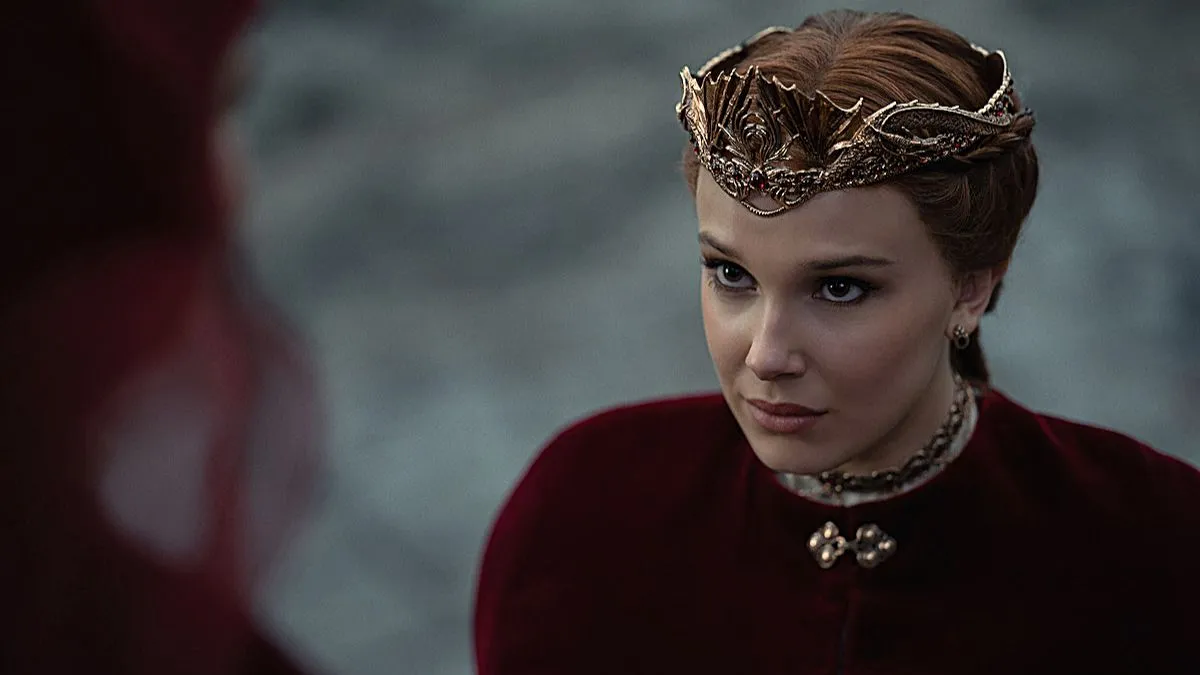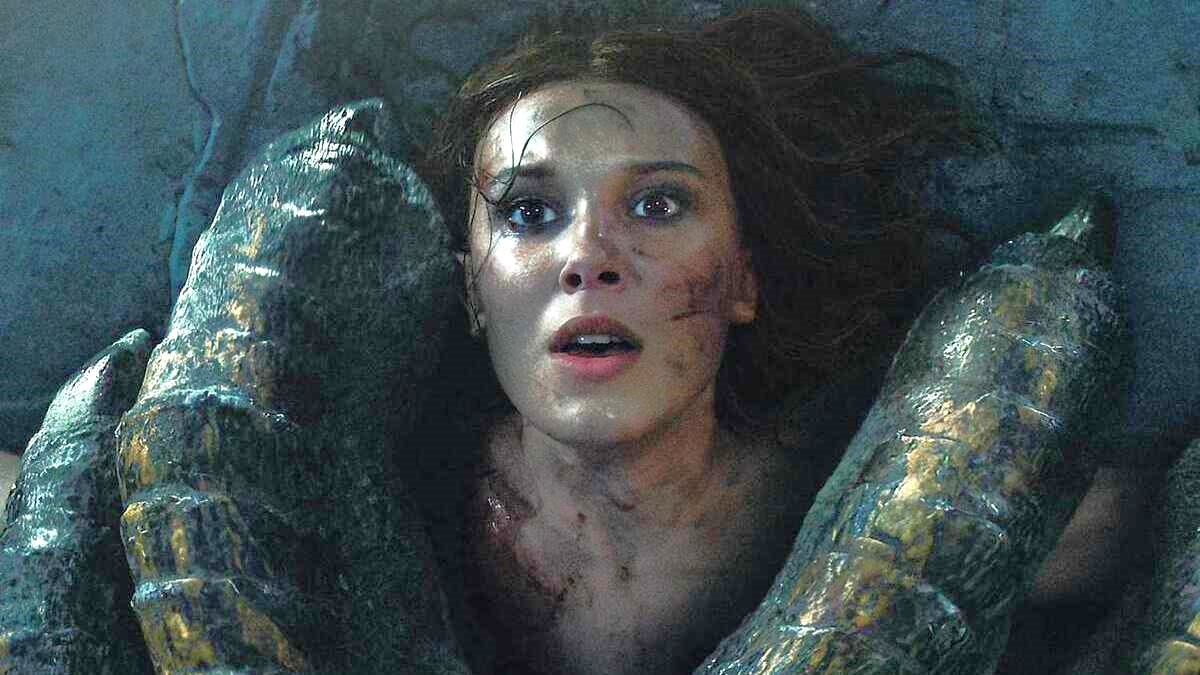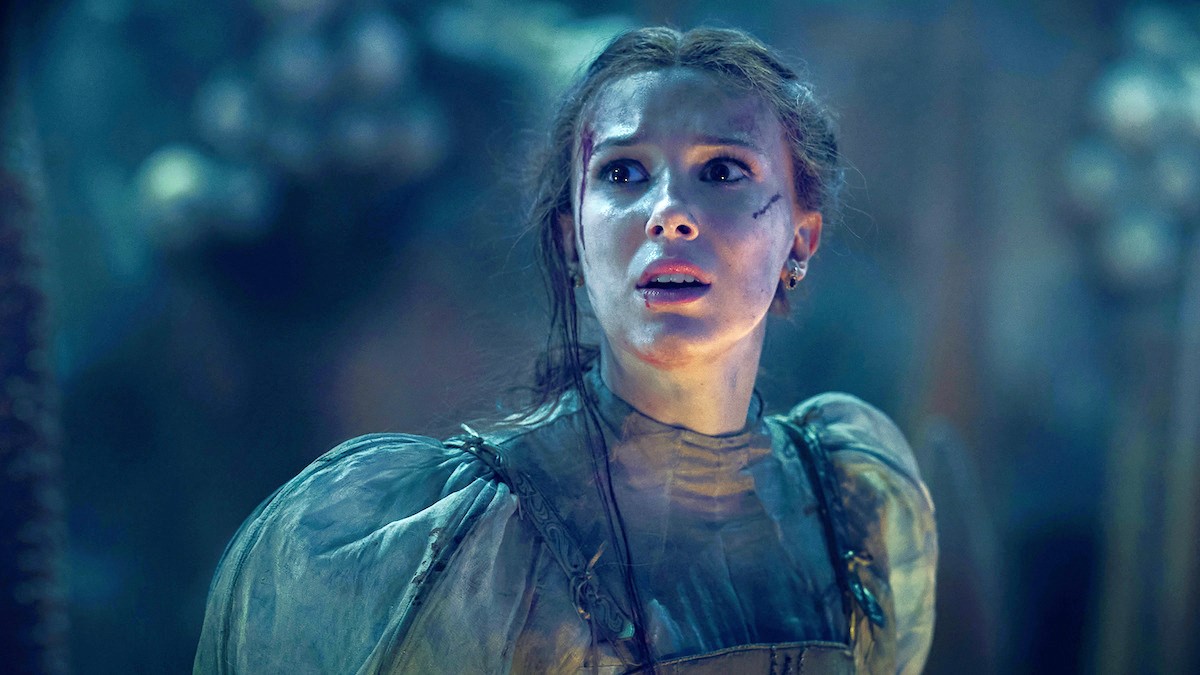
Millie Bobby Brown is essentially Netflix’s bread and butter — the modern version of a studio system star who’s become the face of the streamer, for better and for worse.
After Stranger Things and Enola Holmes, their latest collaboration comes in the form of the defiant fantasy adventure film Damsel, directed by the Spaniard Juan Carlos Fresnadillo, written by Fast X scribe Dan Mazeau, and executive produced by Brown herself. The 20-year-old plays Elodie, daughter of a lord forced to marry a prince to save her family’s starving subjects. Unbeknownst to her, the prince and his parents intend to sacrifice her to break a generations-old curse. The ordeal lands Elodie in a confrontation with a blood-thirsty dragon (voiced by Shohreh Aghdashloo) in a damp, dark cave.
Damsel begins with some voiceover narration from Brown, who informs viewers that this story isn’t one of many where the prince saves the damsel in distress, effectively setting the tone for a film whose release date on International Women’s Day was far from accidental. This mission-statement cliché of an opener creates a worthy set of expectations, though reaching them seems significantly more daunting at the hands of a male writer and a male director. The opening narration, as well as the tagline on the Netflix poster, insist that Damsel is not a fairytale — or, at least, one that aims to subvert the female character conventions of the genre — a goal which has obsessed Hollywood for roughly the last decade. Damsel, at least, is an original story, and not a remake of a male-led box office hit. At most, the film acts as an antithesis to 1987’s The Princess Bride, making Robin Wright the evil queen, and giving its own princess bride a much more active role in choosing her destiny. The rocky mountains, well, those remain.
Damsel fulfills some expectations — heroic action sequences aplenty as Elodie comes face-to-face with the menacing beast; several empowered zingers as the character regains control of her narrative after being toyed around by everyone in her life; and symbolic scenes of hair-cutting, dress-ripping, and corset-unshackling galore. Still, Damsel holds space for enough positive surprises to keep it from completely predictable and formulaic territory.
The action outside the dragon lair is pretty rough going, brought down by farcically mechanical dialogue between farcically mechanical characters that not even Angela Bassett (Elodie’s stepmother), Ray Winstone (Elodie’s father), or Robin Wright could save. However, Damsel’s crucial in-lair action is pure, survivalist adventure magic; Millie Bobby Brown manages, somehow, to generate palpable chemistry with a dragon that, more likely than not, was represented on-set by tennis balls on sticks.

It’s only in the sequences where Elodie explores and conquers the narrow tunnels and slippery floors of the dragon’s home where the viewer is truly transported, and can buy into Damsel’s story. A lot of these scenes’ success may come down to their lack of dialogue — or, perhaps, Brown’s keener understanding of the tone needed for these scenes; they beg for desperation, adrenaline, and anger, much like what Brown channels in her best moments as Stranger Things‘ El. The actress’s face is undoubtedly the most proficient tool at her disposal, and the emptiness and quiet of the setting allow her to make the most of it. Fortunately, for so much of Damsel, we simply accompany Elodie through the cave; she sporadically interacts with the dragon, but mostly she’s left to her own devices to explore its secrets, and uncover the deceitful plot she has fallen prey to. And it works. Elodie’s journey through darkness feels believable, tangible, and tensional, unlike quite literally anything else in the film. The pacing, the directing, and the rhythm become graceful, sharply combining fantasy, horror, fairytale, and action. Even the CGI inside the cave is also — coincidentally or otherwise — miles ahead of the digitally-enhanced imagery found elsewhere. It’s like a completely different film.
Shot on location in the Portuguese Douro Valley, Serra da Estrela, Sortelha, and the Batalha Monastery, Damsel fails to utilize the dreamy landscapes at its disposal, filming most of it in the same glazed and flat photography that Netflix originals have accustomed us to. Simultaneously, the plot, constructed with the sole purpose of getting Elodie into that cave, so she can rescue both herself and the dozens of women who would ultimately become the next victims of the Area royal family, is disappointingly shallow. There’s little to no investment in world-building, which should be a priority in fantasy filmmaking, and the plot twist that ultimately leads to the story’s resolution is contrived and weak.

Among the screenplay’s limitations, there is a saving grace; female characters, and that includes the dragon (but excludes Wright’s villain), show generosity towards one another. There is no sense of Elodie being a braver and more self-sufficient alternative to other, more typically feminine girls. She enjoys the luxuries that her newfound princess lifestyle offers her at first, and shows significant distress in the cave, sobbing, screaming, and begging for help. There’s no cardboard-female-action-lead badass iciness to her. If anything, there’s badass warmth. Elodie empathizes with the multiple girls who never managed to find a way out of the cave, and gives grace to both her stepmother and the dragon where she could have just felt contempt.
There are sporadic sparks of magic in Damsel, especially when it’s navigating its better-fitting element of action fantasy rather than fairytale. Younger audiences might find it a rather revolutionary watch, since it doesn’t shy away from the occasional body gore or Basilisk-like spookiness. And, considering its surprisingly actualized themes of female empowerment, if it really does resonate with the newer generations, then it has already justified its existence.
from Movie News | Movie Reviews | Movie Trailers https://ift.tt/noc3PZT
0 comments: